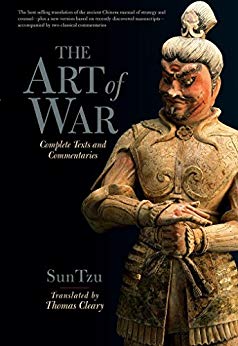

This article is an excerpt from the Shortform summary of "The Art of War" by Sun Tzu. Shortform has the world's best summaries of books you should be reading.
Like this article? Sign up for a free trial here .
Is it true that opportunities multiply as they are seized? And who said this?
The quote “opportunities multiply as they are seized” comes from Sun Tzu’s The Art of War. We’ll cover how you can watch your opportunities multiply when facing down the enemy.
Wearing the Enemy Down
In addition to manipulating a strong enemy into carelessness, forcing the enemy to exert energy will create opportunities of advantage for you. These opportunities multiply as they are seized.
Strategize your efforts so they are geared toward controlling your opponent’s momentum. These tactics include surprise attacks, retreating when they advance, advancing when they retreat, and maneuvering them in different directions.
For example, you might strike a certain portion of the enemy’s forces to push them down a particular path in defense. When their energy shifts to take up this defense, switch your assault to the enemy troops in the opposite direction. Switching attack positions forces your opponent’s defense to hustle down another path to defend against your advance.
Moving them back and forth by forcing them to react to conflict, rather than allowing them to initiate conflict, will keep them on their toes and tire them out. Keep taking advantage of such opportunities–opportunities multiply as they are seized.
The Easy Victory
A victorious leader wins first and battles second. Therefore, a good leader takes advantage of opportunity, wherein they succeed when winning is easy. This works because opportunities multiply as they are seized. An easy victory means understanding the nuances of your opponent in order to preemptively strike.
- Stand on advantageous ground by taking into consideration all circumstances that create vulnerability in your opponent.
- Another way of thinking about advantageous ground is creating a strategy that is so inscrutable and adaptable that defeating you becomes close to impossible.
- You have a contingency for everything, making you always prepared.
- You know your opponents so well as to be able to recognize even the slightest weakness and exploit it.
A good leader knows how to adapt to make any situation an advantageous one. You must have a flexible mind to be able to see advantages in the land and in your position and make use of them. If you maintain a constant stance or structure, you may also reveal your form and weakness of mind to the enemy, which puts your troops in harm.
Be willing to adapt your strategy accordingly depending on the circumstances. If you merely allow the momentum of forces to serve as a guide for action, your advantage will never change.
If you try to push your troops without the benefit of adaptation, even if your force is bigger, you will have a hard time gaining the trust of your troops. If your troops don’t trust your judgement, they won’t fight for you. But if you take advantage of the situation and keep adapting, they’ll follow you. Once you’re on a roll, opportunities multiply as they are seized.
Rules of Adaptation
Sometimes, you’ll lack the initial advantages. Opportunities multiply as they are seized, but you need the first opportunity. The ability to adapt means having contingencies in place when momentum is not on your side. It also means doing the opposite of what seems advantageous in the moment. The following are rules for adaptation:
- Have plans in place for how to handle being surrounded or backed into a corner to balance your disadvantage.
- Avoid action that seems too easy, such as taking a direct route when there are areas on the route that could lend to ambush.
- Don’t attack a weakened enemy when you see that they have nothing to lose.
- Don’t attack an easily taken territory if the locals are loyal and there is an abundance of supplies on hand.
- Don’t attack a territory when keeping it secure would require more effort than what is gained.
- Dismiss the orders of your civil leaders when they lead to emptiness for your troops.
- Do what is right for advantage, not what is right for greed.
The Psychology of Adaptation
Understanding your strategy facilitates adaptation, as does understanding the mindset of the enemy. Psychology plays an important role in actions and counteractions during battle. For instance, what hinders your competitor is the threat of harm. What ties up your competitor is work. What energizes your competitor is possible gain.
Therefore, you should not be resigned to death or feel that life is too precious. Be guided by strategy and momentum only, thereby being immune to goading or flattery. Don’t miss early opportunities to pounce–opportunities multiply as they are seized.
Historical Example: Tempting the Enemy into Formation
Here’s an example of when chasing opportunities hurts you.
During the Spring and Autumn Era, the state of Chu wanted to attack the state of Jiao. The Chu general knew that the Jiao were small and led by volatility. He also knew they had a reputation for chasing opportunities for gain.
He sent a force of unarmed men into Jiao territory under the guise of chopping wood. The men were quickly captured, and the taste of victory grew heavy in the mouth of Jiao’s leaders. Bolstered by this capture, the Jiao sent a force to chase the Chu into the mountains. However, the Chu, knowing the Jiao would not be able to resist this goading, were lying in wait. When the Jiao forces rushed the mountains, the Chu ambushed them and attained victory.
———End of Preview———

Like what you just read? Read the rest of the world's best summary of "The Art of War" at Shortform . Learn the book's critical concepts in 20 minutes or less .
Here's what you'll find in our full The Art of War summary :
- How to mislead your enemies to win the war
- Classic examples from Chinese history to illustrate Sun Tzu's strategies
- How to use spies to gather information and defeat your opponents






